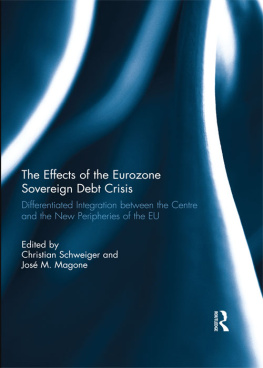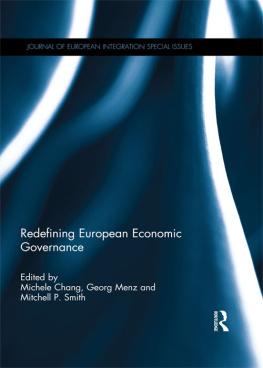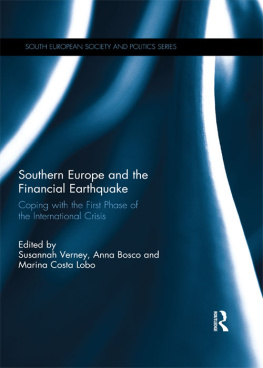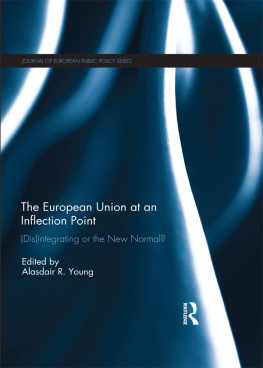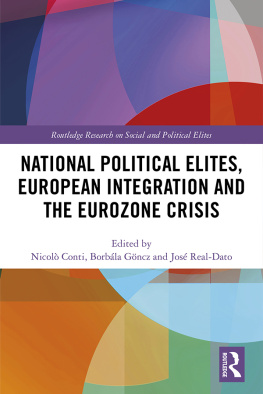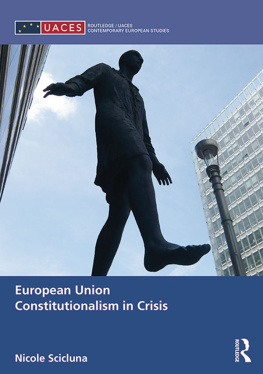The Effects of the Eurozone Sovereign Debt Crisis
The book analyses the emerging centreperiphery divisions within the European Union which result from the unprecedented conditions created by the 200809 global financial crisis and the subsequent Eurozone sovereign debt crisis. The multiple layers of policy coordination which emerged in response to the crisis have initiated a process by which the EU is increasingly divided in terms of the level of vertical integration between the Eurozone core group and differentiated peripheries amongst the outsiders. At the same time the sovereign debt crisis has created a periphery of predominantly Southern European countries within the Eurozone that became dependent on external financial support from the other member states. The contributions in this book critically examine various aspects of the emerging internal post-crisis constellation of the EU. The main focus lies on national and supranational governance issues, national dynamics and dynamics in the Eurozone core as well as in the periphery.
This book was originally published as a special issue of Perspectives on European Politics and Society.
Christian Schweiger is Senior Lecturer in the School of Government and International Affairs at Durham University, UK. His main research interests are the political economy of the EU, national varieties of economic and social development in the member states and transatlantic relations.
Jos M. Magone is Professor of Regional and Global Governance at the Berlin School of Economics and Law, Germany. He has published widely on European politics, particularly on Southern Europe and European integration.
The Effects of the Eurozone Sovereign Debt Crisis
Differentiated Integration between the Centre and the New Peripheries of the EU
Edited by
Christian Schweiger and Jos M. Magone
First published 2015
by Routledge
2 Park Square, Milton Park, Abingdon, Oxon, OX14 4RN, UK
and by Routledge
711 Third Avenue, New York, NY 10017, USA
Routledge is an imprint of the Taylor & Francis Group, an informa business
2015 Taylor & Francis
All rights reserved. No part of this book may be reprinted or reproduced or utilised in any form or by any electronic, mechanical, or other means, now known or hereafter invented, including photocopying and recording, or in any information storage or retrieval system, without permission in writing from the publishers.
Trademark notice: Product or corporate names may be trademarks or registered trademarks, and are used only for identification and explanation without intent to infringe.
British Library Cataloguing in Publication Data
A catalogue record for this book is available from the British Library
ISBN 13: 978-1-138-85109-2
ePub eISBN 13: 978-1-317-53072-5
Mobipocket/Kindle eISBN 13: 978-1-317-53071-8
Typeset in Times New Roman
by RefineCatch Limited, Bungay, Suffolk
Publishers Note
The publisher accepts responsibility for any inconsistencies that may have arisen during the conversion of this book from journal articles to book chapters, namely the possible inclusion of journal terminology.
Disclaimer
Every effort has been made to contact copyright holders for their permission to reprint material in this book. The publishers would be grateful to hear from any copyright holder who is not here acknowledged and will undertake to rectify any errors or omissions in future editions of this book.
Contents
Christian Schweiger & Jos M. Magone
Brigid Laffan
Caroline de la Porte & Philippe Pochet
Christian Schweiger
Lothar Funk
Stefan Auer
Anna Visvizi
Jos M. Magone
Bela Galgoczi
Maciej Duszczyk
Olivr Kovcs
The chapters in this book were originally published in Perspectives on European Politics and Society, volume 15, issue 3 (September 2014). When citing this material, please use the original page numbering for each article, as follows:
Chapter 1
Introduction: Differentiated Integration and Cleavage in the EU under Crisis Conditions
Christian Schweiger & Jos M. Magone
Perspectives on European Politics and Society, volume 15, issue 3 (September 2014) pp. 259265
Chapter 2
Framing the Crisis, Defining the Problems: Decoding the Euro Area Crisis
Brigid Laffan
Perspectives on European Politics and Society, volume 15, issue 3 (September 2014) pp. 266280
Chapter 3
Boundaries of Welfare between the EU and Member States during the Great Recession
Caroline de la Porte & Philippe Pochet
Perspectives on European Politics and Society, volume 15, issue 3 (September 2014) pp. 281292
Chapter 4
The EU25 Fiscal Compact: Differentiated Spillover Effects under Crisis Conditions
Christian Schweiger
Perspectives on European Politics and Society, volume 15, issue 3 (September 2014) pp. 293304
Chapter 5
Why has the German Job Market Done Astonishingly Well Despite the 20082009 Great Recession? New Economic Miracle, Institutional Transformation or Beggar-thy-Neighbour Policies?
Lothar Funk
Perspectives on European Politics and Society, volume 15, issue 3 (September 2014) pp. 305321
Chapter 6
The Limits of Transnational Solidarity and the Eurozone Crisis in Germany, Ireland and Slovakia
Stefan Auer
Perspectives on European Politics and Society, volume 15, issue 3 (September 2014) pp. 322334
Chapter 7
From Grexit to Grecovery: The Paradox of the Troikas Engagement with Greece
Anna Visvizi
Perspectives on European Politics and Society, volume 15, issue 3 (September 2014) pp. 335345
Chapter 8
Portugal Is Not Greece: Policy Responses to the Sovereign Debt Crisis and the Consequences for the Portuguese Political Economy
Jos M. Magone
Perspectives on European Politics and Society, volume 15, issue 3 (September 2014) pp. 346360
Chapter 9
The Tale of Two Peripheries in a Divided Europe
Bela Galgoczi
Perspectives on European Politics and Society, volume 15, issue 3 (September 2014) pp. 361369
Chapter 10
Poland under Economic Crisis Conditions
Maciej Duszczyk
Perspectives on European Politics and Society, volume 15, issue 3 (September 2014) pp. 370384
Chapter 11
Hungary and the Eurozone the Need for a More Systemic Approach
Olivr Kovcs
Perspectives on European Politics and Society, volume 15, issue 3 (September 2014) pp. 385399
Please direct any queries you may have about the citations to
clsuk.permissions@cengage.com
Stefan Auer is an Associate Professor and Director of European Studies in the School of Modern Languages and Culture at the University of Hong Kong.
Maciej Duszczyk is Deputy Director of the Institute of Social Policy and Member of the Board of the Centre of Migration Research at the University of Warsaw, Poland.

